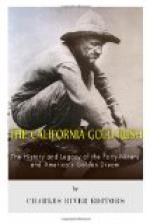About this time was perpetrated a crime of violence no worse than many hundreds which had preceded it, but occurring at a psychological time. A gambler named Charles Cora shot and killed William Richardson, a United States marshal. The shooting was cold-blooded and without danger to the murderer, for at the time Richardson was unarmed. Cora was at once hustled to jail, not so much for confinement as for safety against a possible momentary public anger. Men had been shot on the street before—many men, some of them as well known and as well liked as Richardson—but not since public sentiment had been aroused and educated as the Bulletin had aroused and educated it. Crowds commenced at once to gather. Some talk of lynching went about. Men made violent street-corner speeches. The mobs finally surged to the jail, but were firmly met by a strong armed guard and fell back. There was much destructive and angry talk.
But to swing a mob into action there must be determined men at its head, and this mob had no leader. Sam Brannan started to say something, but was promptly arrested for inciting riot. Though the situation was ticklish, the police seem to have handled it well, making only a passive opposition and leaving the crowd to fritter its energies in purposeless cursing, surging to and fro, and harmless threatenings. Nevertheless this crowd persisted longer than most of them.
The next day the Bulletin vigorously counseled dependence upon the law, expressed confidence in the judges who were to try the case—Hager and Norton—and voiced a personal belief that the day had passed when it would ever be necessary to resort to arbitrary measures. It may hence be seen how far from a contemplation of extra legal measures was King in his public attitude. Nevertheless he added a paragraph of warning: “Hang Billy Mulligan—that’s the word. If Mr. Sheriff Scannell does not remove Billy Mulligan from his present post as keeper of the County Jail and Mulligan lets Cora escape, hang Billy Mulligan, and if necessary to get rid of the sheriff, hang him—hang the sheriff!”




